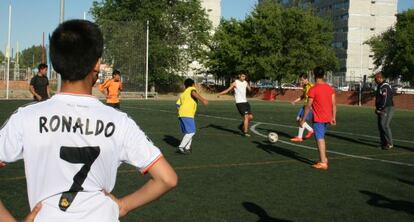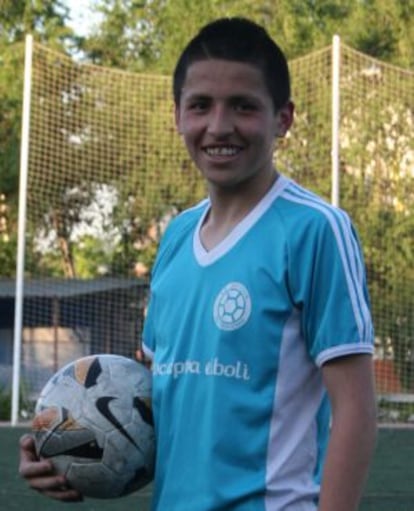How a soccer academy for Latin American kids is flourishing in Madrid
Dozens of Colombians, Ecuadorians and Dominicans dream about reaching La Liga Donations help pay for scholarships at the Orcarsur neighborhood learning center

In December 2011, 15-year-old Camilo Quintero arrived in Madrid from Colombia to live with his mother and sister, who had moved here 10 years earlier.
At first, everything seemed strange to him – the Spanish accent, the food, the weather and the people – but he soon found a common bond that prompts as much passion in Madrid as it does in his native city of Armenia: soccer.
Not only do the boys share the same love for soccer but they are also all children of Latin American migrants
Just two weeks after his arrival, Camilo began training at a soccer academy in Orcasur, a neighborhood in the southern end of the Spanish capital. He soon made friends with other kids from Colombia, Ecuador, Chile and Bolivia - children who not only shared his love for soccer, but who were also the sons of Latin American migrants.
About 110 boys between the ages of five and 18 practice at the Maris Stella stadium every afternoon, Monday through Thursday. The sessions are organized by Orcarsur sin Fronteras (Orcasur without borders), an academy opened 12 years ago by Colombian migrant Edgar Silva.
“I have always enjoyed helping others, and I was seeing many Latin American children in this area,” says Silva, who has been living in Spain for more than two decades.
“I wanted to see them integrate, to feel that someone cared about them, to feel like this was their family. And I wanted to see them share their passion for soccer,” he explains.
“Let’s do it, let’s do it! I want to see those legs kick higher,” shouts Patricio Acaro, one of the coaches who trains the 14-to-15-year-old group.

Every player here dreams about making it to the big leagues. One of the dreamers is Alejandro Pérez, a 14-year-old who was born in Madrid to Dominican parents, and who hopes that one day Real Madrid will recruit him.
And then there are others who, as they get older, realize that the possibility of making a professional career out of soccer is remote, and decide to take another path.
Kevin Castillo’s mother explains that when her 18-year-old son was still a child, all he wanted to talk about was soccer and he refused to study.
“I am too old for this soccer business,” says Castillo, the son of Ecuadorian migrants who arrived in Spain when he was six years old. He now feels a bit embarrassed every time his mother retells the story about his childhood obsession.
Castillo is now studying to become a hotel waiter, and brings an electric razor to soccer practice in case one of his teammates needs a haircut. Charging them between €3 and €6, he doesn’t have to ask his parents for money to go out on weekends.
“I see how difficult it is for my parents to make ends meet at the end of the month,” he says.
When the academy first opened, there was no tuition and practice was held on a dirt pitch
Silva, the academy director, said that the kids feel like one big family.
“We are like brothers. Because we are Latin Americans, we treat each other on the same basis – even our vocabulary is different [from Spaniards'], we understand one another,” says Pérez.
When the academy first opened, there was no tuition and very few students. Practice sessions were held on a dirt pitch and raffles were organized to pay for uniforms and boots.
Now parents pay €30 a month – or whatever they can afford – for their children to play on teams which now compete in the local Madrid city soccer league on weekends.
“We accept everyone, regardless of whether they can pay or not,” asserts Silva.
At least 30 of the students have scholarships. Sponsors include nearby small businesses, neighbors and Usera town hall.
“They give us what they can – some give €50 or €100 to sponsor a kid for a few months, and we take it from there,” Silva explains.
Since its opening 12 years ago, over 1,400 children and teenagers have graduated from the academy.
“Now I just want to see the fruits of my labor,” says the director, who is waiting for one of his pupils to make it to La Liga.
The student who has gone the furthest now plays with the third division team of Club Deportivo Colonia Moscardó.
But for many of the students, the dreams remain.
Camilo Quintero feels that with a lot of work, perhaps he will one day play for Barça. And why not? He jokes that he comes from the same bloodstock as his idols: James (Colombian) and Neymar (Brazilian).
Tu suscripción se está usando en otro dispositivo
¿Quieres añadir otro usuario a tu suscripción?
Si continúas leyendo en este dispositivo, no se podrá leer en el otro.
FlechaTu suscripción se está usando en otro dispositivo y solo puedes acceder a EL PAÍS desde un dispositivo a la vez.
Si quieres compartir tu cuenta, cambia tu suscripción a la modalidad Premium, así podrás añadir otro usuario. Cada uno accederá con su propia cuenta de email, lo que os permitirá personalizar vuestra experiencia en EL PAÍS.
¿Tienes una suscripción de empresa? Accede aquí para contratar más cuentas.
En el caso de no saber quién está usando tu cuenta, te recomendamos cambiar tu contraseña aquí.
Si decides continuar compartiendo tu cuenta, este mensaje se mostrará en tu dispositivo y en el de la otra persona que está usando tu cuenta de forma indefinida, afectando a tu experiencia de lectura. Puedes consultar aquí los términos y condiciones de la suscripción digital.








































